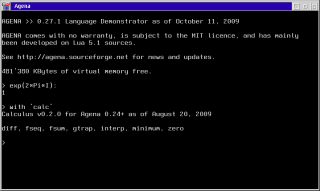Agena is an easy-to-learn procedural programming language suited for everyday usage. It has been implemented as an interpreter and can be used in scientific, educational, linguistic, and many other applications. Its syntax looks like very simplified Algol 68 with elements taken from Lua and SQL.
Agena
Version:
6.7.4
Release date:
Monday, 9 March, 2009
Categories:
License:
- GPL
Interface:
- VIO
Manual installation
Following ones are the download links for manual installation:
| Agena v. 6.7.4 (8/2/2026, Alexander Walz) | Readme/What's new |
agena >>
`The Power of Procedural Programming`
6.7.4 Isfahan, February 08, 2026
- With univariate functions, `calc.differ` now calls `dual.diff` internally to return high-accuracy results if possible. Should
the function to be differentiated include functions and operators not supporting dual numbers, `calc.differ` automatically reverts
to the classic differentiating functions `calc.eulerdiff`, `calc.xpdiff`, `calc.diff`.
- `calc.extrema`, `calc.minimum`, `calc.maximum`, `calc.inflect`, `calc.saddles` and `calc.curvature` now call `dual.diff` internally
if possible to return high-accuracy results, too.
- The `+`, `-`, `*`, `/`, `^` and `**` could freeze when given `undefined` or `infinity` as an argument. This has been fixed.
- With negative dual numbers, the `^` operator no longer returns `undefined` but mostly a finite result. `x^0` and `x**0` now either
correctly yield `undefined` or `1`.
- The `^` and `**` operators could not correctly compute derivatives at the origin and with an integral power. This has been fixed,
also benefitting `dual.diff`.
- There has been a general problem with the Agena numbers `undefined` or `infinity`, or these non-finite values packed into dual
numbers, passed to dual-number functions and operators, causing segmentation faults or freezes. This has been fixed.
6.7.3 Isfahan, February 06, 2026
- On Intel platforms, the precision of `calc.Psi` with the first and second derivative has been improved by three to four digits,
now calculating the results with 80-bit precision. Thus, the function now fully utilizes 80-bit floating-point math.
- The precision of the `gamma` and `fact` functions has been improved a tiny bit in the real domain with larger arguments
on Intel platforms.
- On Intel platforms, all trigonometric and hyperbolic functions internally call the same underlying 80-bit precision
C functions, also to protect the interpreter against unpredictable and peculiar behaviour in OS/2.
- `math.lnbeta` is now better detecting poles.
- On Raspberry Pi, `long.csch`, `long.sech` and `long.coth` have become 50 percent faster by calling the respective
Sun Microsystems implementations instead of the built-in GCC ones |
 sourceforge.net/projects/agena/files/Binaries/Agena 6.7.4/agena-6.7.4-os2.wpi/download sourceforge.net/projects/agena/files/Binaries/Agena 6.7.4/agena-6.7.4-os2.wpi/download |
||
| Agena v. 4.12.5 (20/5/2025, Alexander Walz) | Readme/What's new |
4.12.5 Merryville, May 20, 2025
- In the past, the bitshift operators <<< (left shift), >>> (right shift), <<<< (left rotation) and >>>> (right rotation) had different behaviour across platforms when a number at or beyond the +/-2^32 threshold has been processed. This has been changed and the results in these situations are now the same.
Likewise, `bytes.numto32` is now returning the same results on all platforms when casting a value at or beyond the +/-2^32 border.
This also benefits various functions in the `hashes` package as their returns are now the same across platforms, as well.
To check the new underflow or overflow behaviour, use `math.wrap`.
- New function `math.fmod` works and returns the same result as the binary `symmod` operator. It has just been added to facilitate porting C code to Agena.
- The results of `hashes.mix`, `hashes.crc32`, `hashes.crc8`, `hashes.reflect`, `hashes.parity`, `hashes.fibmod`, `hashes.interweave`, `hashes.jinteger` may now be different with out-of-range input, that is with arguments at or beyond the 2^32 threshold, depending on your platform. |
 www.hobbesarchive.com/Hobbes/pub/os2/dev/proglang/misc/Agena_4-12-5.wpi www.hobbesarchive.com/Hobbes/pub/os2/dev/proglang/misc/Agena_4-12-5.wpi |
||
| Agena Manual v. 6.7.4 (, Alexander Walz) | ||
 sourceforge.net/projects/agena/files/Manuals/agena.pdf/download sourceforge.net/projects/agena/files/Manuals/agena.pdf/download |
||
| Agena source code v. 6.7.4 (Source code, , Alexander Walz) | ||
 sourceforge.net/projects/agena/files/Sources/agena-6.7.4-src.tar.gz/download sourceforge.net/projects/agena/files/Sources/agena-6.7.4-src.tar.gz/download |
Record updated last time on: 08/02/2026 - 13:31

This work is licensed under a Creative Commons Attribution 4.0 International License.



Comments
Alexander Walz
Sat, 13/05/2017 - 20:06
Permalink
Hello,
Add new comment